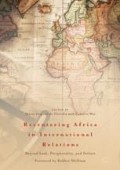Abstract
This chapter contextualizes the volume and its major themes.
Access this chapter
Tax calculation will be finalised at checkout
Purchases are for personal use only
References
Agathangelou, A. M., & Killian, K. D. (Eds.). (2016). Time, Temporality and Violence in IR: Defatalizing the Present, Forging Radical Alternatives. New York: Routledge.
Bach, D. C. (2013). Africa in International Relations: The Frontier as Concept and Metaphor. South African Journal of International Affairs, 20(1), 1–22.
Berdal, M., & Keen, D. (1997). Violence and Economic Agendas in Civil Wars: Some Policy Implications. Millennium: Journal of International Studies, 26(3), 795–818.
Berdal, M., & Malone, D. M. (2000). Greed and Grievance: Economic Agendas in Civil Wars. Boulder, CO: Lynne Rienner.
Brown, W., & Harman, S. (Eds.). (2013). African Agency in International Politics. New York: Routledge.
Castells, M. (1996). The Rise of the Network Society: The Information Age: Economy, Society, and Culture Volume I. Oxford: Blackwell.
Chakrabarty, D. (2000). Provincializing Europe: Postcolonial Thought and Historical Difference. Princeton, NJ: Princeton University Press.
Comaroff, J., & Comaroff, J. (2012). Theory from the South, or, How Euro-America is Evolving Toward Africa. New York: Paradigm.
Cox, R. W. (1981). Social Forces, States and World Orders: Beyond International Relations Theory. Millennium: Journal of International Studies, 10(2), 126–155.
DFID. (2004). The Africa Conflict Prevention Pool: An Information Document. London: DFID.
Duffield, M. (2001). Global Governance and New Wars: The Merging of Security and Development. London: Zed Books.
Dunn, K. C., & Shaw, T. M. (Eds.). (2001). Africa’s Challenge to International Relations Theory. New York: Palgrave.
Foucault, M. (1970). The Order of Things. London: Routledge.
Gettleman, J. (2016, October, 17) ‘Africa Rising’? ‘Africa Reeling’ May Be More Fitting Now. New York Time. Retrieved February 24, 2017, from https://www.nytimes.com/2016/10/18/world/africa/africa-rising-africa-reeling-may-be-more-fitting-now.html
Grovogui, S. N. (2016, October 22–23). Racialized Realities in World Politics: Concluding Thoughts. Closing Roundtable, 2016 Millennium Conference, London.
Grovogui, S. N. (2006). Beyond Eurocentrism and Anarchy: Memories of International Order and Institutions. New York: Palgrave Macmillan.
Hammond, D., & Jablow, A. (1970). The Africa that Never Was: Four Centuries of British Writing About Africa. New York: Twayne Publishers.
Haslam, J. (2000). The Vices of Integrity: E.H. Carr, 1892–1982. New York: Verso.
Hoffmann, S. (1977). An American Social Science: International Relations. Daedalus, 106(3), 41–60.
Keen, D. (1998). The Economic Functions of Violence in Civil War. Adelphi Paper 320. London: International Institute for Strategic Studies.
Kniwane, T. C. (2001). Africa and International Relations: Regional Lessons for a Global Discourse. International Political Science Review, 22(3), 278–290.
Mamdani, M. (1996). Citizen and Subject: Contemporary African and the Legacy of Late Colonialism. Princeton, NJ: Princeton University Press.
Mbembe, A. (2001). On the Postcolony. Berkeley, CA: University of California Press.
Miller, C. L. (1985). Blank Darkness: Africanist Discourse in French. Chicago: Chicago University Press.
Mudimbe, V. Y. (1988). The Invention of Africa: Gnosis, Philosophy and the Order of Knowledge. Bloomington and Indianapolis: Indiana University Press.
Mudimbe, V. Y. (1991). Parables and Fables: Exegesis Textuality and Politics in Central Africa. Madison, WI: The University of Wisconsin Press.
Mudimbe, V. Y. (1994). The Idea of Africa. Bloomington and Indianapolis: Indiana University Press.
Mudimbe, V. Y. (2013). On African Fault Line: Meditations on Alterity Politics. Durban: University of KwaZulu/Natal Press.
Murithi, T. (Ed.). (2014). Handbook of Africa’s International Relations. New York: Routledge.
Reno, W. (1998). Warlord Politics and African States. Boulder, CO: Lynne Rienner.
Shilliam, R. (2017). Race and Revolution at Bwa Kayiman. Millennium: Journal of International Studies, 1–24. https://doi.org/10.1177/0305829817693692.
Smith, S. (1996). Positivism and Beyond. In S. Smith, K. Booth, & M. Zalewski (Eds.), International Theory: Positivism and Beyond (pp. 1–46). Cambridge: University of Cambridge Press.
Smith, S. (2000). The Discipline of International Relations: Still an American Social Science? British Journal of Politics and International Relations, 2(3), 374–402.
Smith, S. (2002). The United States and the Discipline of International Relations: Hegemonic Country Hegemonic Discipline. International Studies Review, 4(2), 67–85.
Trouillot, M.-R. (1995). Silencing the Past: Power and the Production of History. Boston, MA: Beacon Press.
Wai, Z. (2012). Epistemologies of African Conflicts: Violence, Evolutionism and the War in Sierra Leone. New York: Palgrave Macmillan.
Wai, Z. (2014). Empire’s New Clothes: Africa, Liberal Interventionism and Contemporary World Order. Review of African Political Economy, 41(142), 483–499.
Wai, Z. (2015). On the Predicament of Africanist Knowledge: Mudimbe, Gnosis and the Challenge of the Colonial Library. International Journal of Francophone Studies, 18(2&3), 263–290.
Author information
Authors and Affiliations
Editor information
Editors and Affiliations
Rights and permissions
Copyright information
© 2018 The Author(s)
About this chapter
Cite this chapter
Wai, Z. (2018). Africa in/and International Relations: An Introduction. In: Iñiguez de Heredia, M., Wai, Z. (eds) Recentering Africa in International Relations. Palgrave Macmillan, Cham. https://doi.org/10.1007/978-3-319-67510-7_1
Download citation
DOI: https://doi.org/10.1007/978-3-319-67510-7_1
Published:
Publisher Name: Palgrave Macmillan, Cham
Print ISBN: 978-3-319-67509-1
Online ISBN: 978-3-319-67510-7
eBook Packages: Political Science and International StudiesPolitical Science and International Studies (R0)

